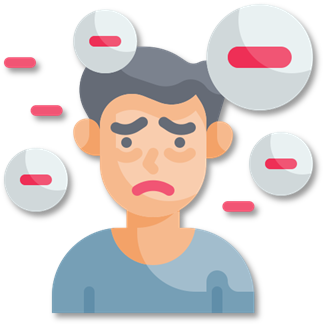Step 3: Effects
| Topic | Question | Answer |
Positive consequences | Which positive effects are expected from the AI-functions - to the performance of the actors who work with the AI (e.g., accuracy, speed, ...)? - to the state of them (e.g., stress, understanding, trust, ...)? Answer: - Memory accuracy. The patient with memory-loss dementia, being at healthcare facility tends to partly or completely lose memories on his relatives and friends. AI would help collecting data on relatives, which would allow it to refresh the patients memory, ask for additional details and increase its accuracy. - Social connection. During the moments, when patient is at the care center without relatives, AI would increase feeling of social connection, by reminding about relatives. - Better relative attitude. Some relatives might have felt irritated or sad, that person with dementia has forgotten their name or some important information about them. As also, relatives might find unnecessary to share some information with the patient, as he could forget it. AI would remove this negative bias, and bring more importance to conversations with the patient. - Quality of conversations. In cases where patient has severe memory loss, often, conversations would repeat on the same topics. AI would help patient keeping conversation on higher level, by allowing to remember previous conversations. - Reduce emotional stress. Some people with memory-loss might feel sad and stressed about forgetting his relatives. AI would alleviate the problem, allowing patient to renew the information and reduce stress. - Keep track of time. Patients that are in a healthcare facility develop additional memory loss problems and lose track of time due to them being confined in a room without a regular schedule or structure due to their day. The agent could remind the patient of the day, give suggestions on how to structure the day and help them to remember important events. | |
Negative consequences | Do you foresee potential negative effects of the AI-functions: - on the performance, state and/or values of the actors? - on more general ethical or societal aspects? What are they? Answer: - Lack of privacy. As patient with memory loss would fill in information on his relatives to the AI, other people would also be able to access that information. Since relatives are able to oversee and edit the information on themselves, they would essentially enter the privacy of the patient, reading their notes. - Irritation. Patient might feel irritated, in case AI reminds him something he still remembers. - Misinformation. In case patient doesn't see some relative for a while, patient might start editing the bio of the relative, entering some of their misconceptions in. That might lead to confusion and irritation of the relative once they realise that patient had misconceptions about them. This becomes more important with certain kinds of dementia, like Parkisons, where patients may suffer from paranoid delusions and where reminding them of those delusions could lead into a negative spiral. | |
Impact on use-case | What is the impact of the AI functions on the overall use case? What does it add to the use case/how does it improve the use case as a whole? Answer: Overall, the main function of AI would be to support memory of the patient with memory loss and help them to organize memories of their relatives. The primary impacts of it would be: better relations between patient and relatives, reduce the feeling of loneliness while relatives are not at the healthcare facility, and increase probability of patient to remember certain facts on their own own. It would improve the use case by making interactions with the patient closer to interactions with healthy people. |



